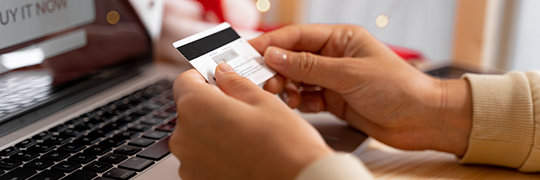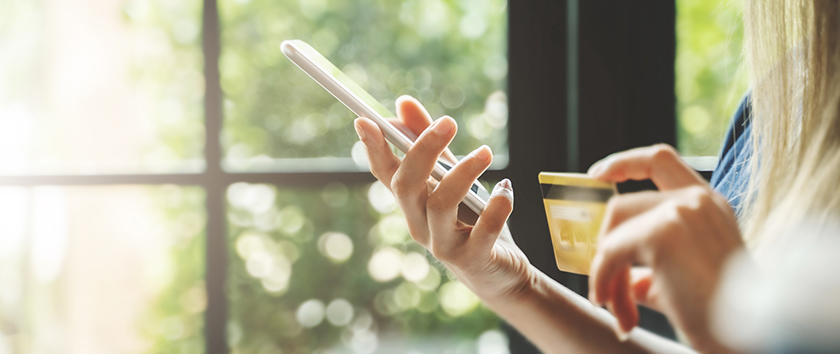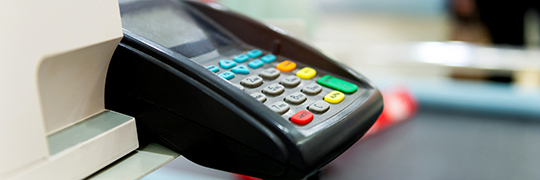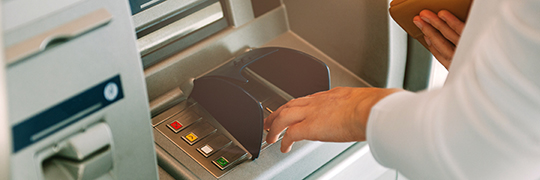
Key Takeaways
- Debit cards are linked to your bank or credit union account. Your spending is limited to what is available in your account.
- Unlike credit cards, debit cards do not allow users to build a credit history.
- Debit cards are often just as secure as credit cards—but there are some caveats.
Chances are, you have a debit card in your wallet. You may even use it several times a day. But, how much do you know about that ubiquitous piece of plastic? Here are some debit card flip card facts that may surprise you.
Test Your Debit Card Knowledge
Flip Card Fact #1

Are there limits to what I can withdraw from my account with a debit card?
Yes.
To protect cardholders, most financial institutions set daily limits for ATM withdrawals, cash-back transactions, and point-of-sale (POS) purchases. Maps Credit Union allows daily withdrawals of up to $400 per day at authorized ATMs. There is also a limit of 3 ATM transactions daily and 25 daily POS transactions (with a daily limit of $25,000).
Flip Card Fact #2

Is my debit card as secure as a credit card?
Yes…and no.
Modern technology makes debit and credit cards equally safe, although credit cards typically offer more protection against fraudulent activity. To keep your debit card safe, sign your card and stay alert at ATMs and registers. Don’t share your PIN and—we hope this goes without saying—don’t write it on the back of your card. You can also add a layer of protection by using your debit and credit cards through a digital wallet app (like Apple Pay).
Flip Card Fact #3

Can I use my debit card for small purchases?
Absolutely.
Your debit card works like cash. As long as you have available funds, you can use your debit card for purchases big and small. You can even opt to Round Up your purchases and have the difference deposited in your Member Rewards account. That way, your checking balance will always be a round number. Plus, members who enroll in Round Up save (on average) about $99 per year.
Flip Card Fact #4

Can I use my debit card to build or rebuild my credit score?
Nope.
Your debit card won’t affect your credit score. Credit scores are based on a person’s borrowing and payment history. Credit bureaus calculate that history (like missed payments, credit balances, and delinquent accounts) from the information they receive. They do not receive reports on debit card transactions and bank balances—even if you select the ‘credit’ option when paying with your debit card.
Flip Card Fact #5

Is there a difference between “debit” and “credit” when I pay with my debit card?
Yes, but either will work.
Whichever option you choose, the money will be drawn from your account. However, if you run your debit card as credit, you may sign your name for the transaction instead of entering your PIN. “Credit” transactions typically take a day or two to clear while debit transactions process immediately. “Credit” transactions (whether from a debit or credit card) also cost the merchant slightly more than debit transactions.
Flip Card Fact #6

Can I use my debit card to shop online?
You sure can. Just be careful.
When shopping online, your debit card works more or less like a credit card. However, most financial experts recommend using credit cards over debit cards for online purchases. This is because credit cards typically offer enhanced fraud protection—and if someone steals your debit card number, your entire bank account is vulnerable. So, if you shop online with a debit card, be extra vigilant. Avoid public Wi-Fi, buy only from trusted retailers, and never store your payment information online.
Flip Card Fact #7

Do I have to pay fees if I use my debit card at the ATM?
No. Mostly.
Maps members have unlimited free access to Maps ATMs and over 30,000 CO-OP ATMs in all 50 states and multiple countries. You can even make surcharge-free deposits at 9,000 CO-OP ATMs. That said, non-Maps ATM fees may still apply to other ATMs (including Chase, U.S. Bank, Wells Fargo, and Non-CO-OP Credit Union ATMs).
If you have questions about your debit card (or any other banking matter) give us a call! In the meantime, here are some smart practices to consider when using your debit card:
- Use your debit card to manage spending. Since the funds are immediately drawn from your account, you won’t accumulate more debt. Just be sure your purchases don’t leave you short on cash for monthly bills and other necessary expenses.
- Monitor your transactions closely. Watch your balance in online banking to avoid exceeding your spending limit.
- Keep your credit card for emergencies. Credit cards aren’t a substitute for an emergency fund, but if you’re paying down debt, it’s better not to rack up more. Limit purchases to your debit card to stay within your means. Use your credit card only if you’re short on cash and to build credit.
- Only use Maps or CO-OP ATMs. ATMs in airports, subway stations, and other public places are at greater risk of “skimmer” devices. It happens at banks too, but it’s less common given the increased surveillance. Instead, take advantage of the Maps network of fee-free CO-OP ATMs.
- Protect your PIN. Memorize your PIN, don’t write it down or share it with others—especially strangers.
- Stay safe online. Avoid using your debit card when browsing on public Wi-Fi. Limit online shopping to credit cards or trusted retailers.
- Report lost or stolen cards immediately. If you lose your card, call us at 503.588.0181 or stop by a branch. We can issue a new card and check for any suspicious activity.
